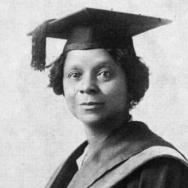The late Georgiana Rose Simpson, who in 1921 became the first African-American woman to earn a PhD from the University of Chicago and one of the first black women to receive a PhD in the United States, has been honored with a prominent place on the UChicago campus.
During a standing-room ceremony on Nov. 28, a bronze bust of Simpson was unveiled inside the Reynolds Club, where UChicago leaders, alumni and students honored Simpson’s legacy and scholarship.
“Monuments matter, but they are particularly important for diversity and inclusion,” said Melissa Gilliam, vice provost for academic leadership advancement and diversity at UChicago. “A monument of an African-American scholar of German philology de-biases our minds, challenges stereotypes and forces us to rethink and reconsider our narratives about scholarship and the history of the University of Chicago.”
To bring Simpson’s story to light, fourth-year UChicago students Asya Akca and Oluwaseyi “Shae” Omonijo spearheaded the Monumental Women Project. Together they sought to empower women and recognize more historical hidden figures from underrepresented groups on campus.
The project founders, along with support from various funding sources inside and outside the University, raised close to $50,000 for the completion of the bronze bust. They selected African-American sculptor Preston Jackson, professor emeritus of the Art Institute of Chicago, to create it.
“For the University, I think that it is critical that we are doing this because Dr. Simpson has been such a role model for me and Shae,” said Akca, who will graduate in 2018 with a dual degree—a master’s in international relations and a bachelor’s in political science.
“We want her to continue to be a role model in the future for other young women at this university. We also want this kind of project to be a model for other unveiling ceremonies of busts recognizing women leaders at universities across the nation.”
Among the dignitaries attending the ceremony was Carol Moseley Braun, the first African-American woman elected to the U.S. Senate. “The significance for me is that these two young women took the initiative to find this history and to light a path for the future,” she said. “Simpson’s story is one of perseverance and excellence for young people.”
Omonijo discovered in the University’s archives that Simpson was dismissed from a dorm after protests by several white Southern women students during the summer of 1906. Simpson was forced to live off campus and complete her bachelor’s degree through correspondence and summer courses.
A scholar of German philology, she earned her PhD in 1921 at the age of 55. Simpson is one of the 45 black students who earned PhDs at the University before 1940—more than any other university in the country. Her contemporaries were prominent scholars W. E. B. Du Bois, Frederick Douglass, Hellen Pitts Douglass and Carter G. Woodson.
She later returned to Washington, D.C., and continued her work as a teacher in modern language at Dunbar High School prior to becoming a professor at Howard University. She died in 1944 at the age of 78.
“Black women are often the footnotes of other people’s stories. We are rarely given the opportunities to be celebrated and honored,” said Omonijo, who will graduate in 2018 with a bachelor’s degree in political science and a minor in human rights.
